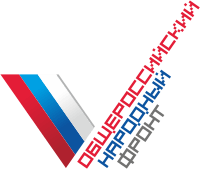People's Front for Russia
| People's Front for Russia | |
|---|---|
 | |
| Leader |
Stanislav Govorukhin, Alexander Brechalov, Olga Timofeeva |
| Founder | Vladimir Putin |
| Founded | May 6, 2011 |
| Headquarters |
|
| Ideology |
Putinism, Conservatism, Centrism |
| Colors | White, Blue, Red |
| Website | |
|
onf | |
|
Politics of Russia Political parties Elections | |
The All-Russia People's Front (Russian: Общероссийский народный фронт), known by its Russian initialism ONF, is a movement in Russia started in 2011 by Vladimir Putin, the then-Prime Minister of Russia, to provide United Russia with "new ideas, new suggestions and new faces". This Front is intended to be a coalition between the ruling party and numerous non-United Russia nongovernmental organizations. On 12 June 2013, Putin was elected its leader.[1]
History
.jpg)
At the meeting of United Russia on May 6, 2011, Putin called for the creation of a "broad popular front [of] like-minded political forces" to participate in the Duma election, including United Russia and other political parties, business associations, trade unions, as well as youth's, women's, and veterans' organizations. He explained that United Russia's party list would include non-party candidates nominated by these organizations.
Following Putin's speech, at headquarters and regional branches, leadership, and a website were quickly set up. Until the popular front works out a five-year plan for the development of Russia to serve as its program, the Front is urging both individuals and groups that care about the "fate" and "victory" of Russia, and want "access to participation in power," to fill out an application on Putin's website. Putin's aides have stated that he is the "informal head" of the popular front, but deputy prime minister and chief of government staff Vyacheslav Volodin has been named the head of the popular front headquarters.
In April 2011, at a meeting with the Coordinating Council of the People's Front, Prime Minister and President-to-be, Putin, said the activities of the front will continue after the election season ends. At the same meeting, Putin also said that Russia should not get into a situation in which the parliament is not a leading political force.[2] By May 2011, hundreds of businesses had enlisted their workforces in the organisation, including around 40,000 from the Siberian Business Union.[3]
On 12 June 2013, the movement convened its inaugural congress and Putin was elected as its leader.[1] Also elected in the front’s Central Staff, were film director Stanislav Govorukhin, Delovaya Rossiya, co-chairman Alexander Galushka, and State Duma member Olga Timofeyeva.[1] According to the Charter, the Front’s goal is, "promotion of unity and civil solidarity in the name of Russia’s historical success"; the country’s development as a free, strong and sovereign state with a robust economy; fast economic growth; and reliance on the family. On the list of the ONF founders were 480 people, including trade union activists, workers, scientists, culture workers, athletes, businessmen, farm and medical workers and politicians.[4]
On 4 December 2013, the conference of the Front was held with the participation of Putin. The conference, which ran until 6 December, discussed the process of implementing Putin’s key reforms in healthcare, economy, community services, education and culture. The meeting held numerous round tables on the president’s so-called "May decrees" and tackle internal agenda items.[5][6]
In January 2014, the Front registered its first regional office in the city of Lipetsk, located about 440 kilometers south of Moscow, with Russia’s Justice Ministry.[7]
Analysis
According to journalist Steve Rosenberg, in an article for the BBC, the ONF may replace the United Russia party that backs Putin, in accordance with the probable reason for its establishment.[8]
References
- ↑ 1.0 1.1 1.2 Putin becomes Popular Front for Russia leader, Interfax-Ukraine (13 June 2013)
- ↑ "People’s Front to Remain Active After Elections - Putin, RIA Novosti, April 3, 2012". En.rian.ru. 2011-05-06. Retrieved 2013-01-08.
- ↑ "Echo of Soviet era in Putin's bid for votes". The Australian. 2011-06-17.
- ↑ "Putin-led People’s Front for Russia - supra-party resource uniting society". Itar Tass. Retrieved 15 June 2013.
- ↑ "Putin to attend All-Russia People's Front conference". Voice of Russia. Retrieved 5 December 2013.
- ↑ "Putin Complains of Rusty Water at Home". RIA Novosti. Retrieved 5 December 2013.
- ↑ "Putin-Led Civic Movement Registers First RegionalBranch". RIA Novosti. Retrieved 3 January 2014.
- ↑ "Putin inaugurates new movement amid fresh protests". BBC. Retrieved 2013-06-12.
External links
| ||||||||||||||